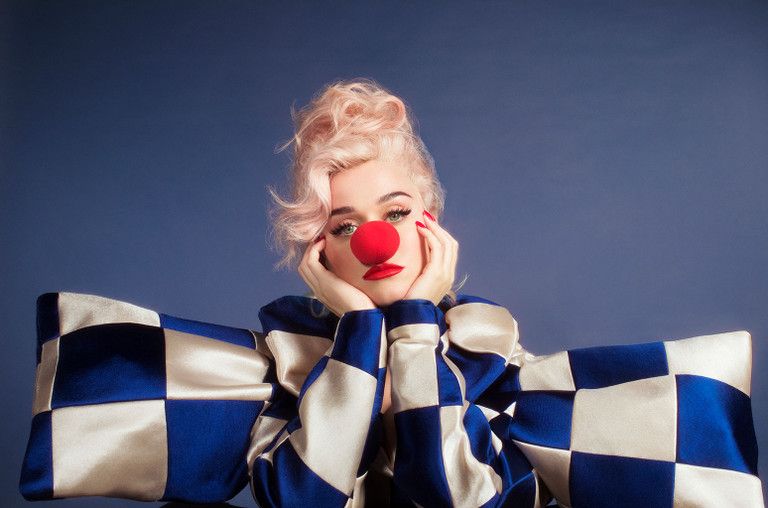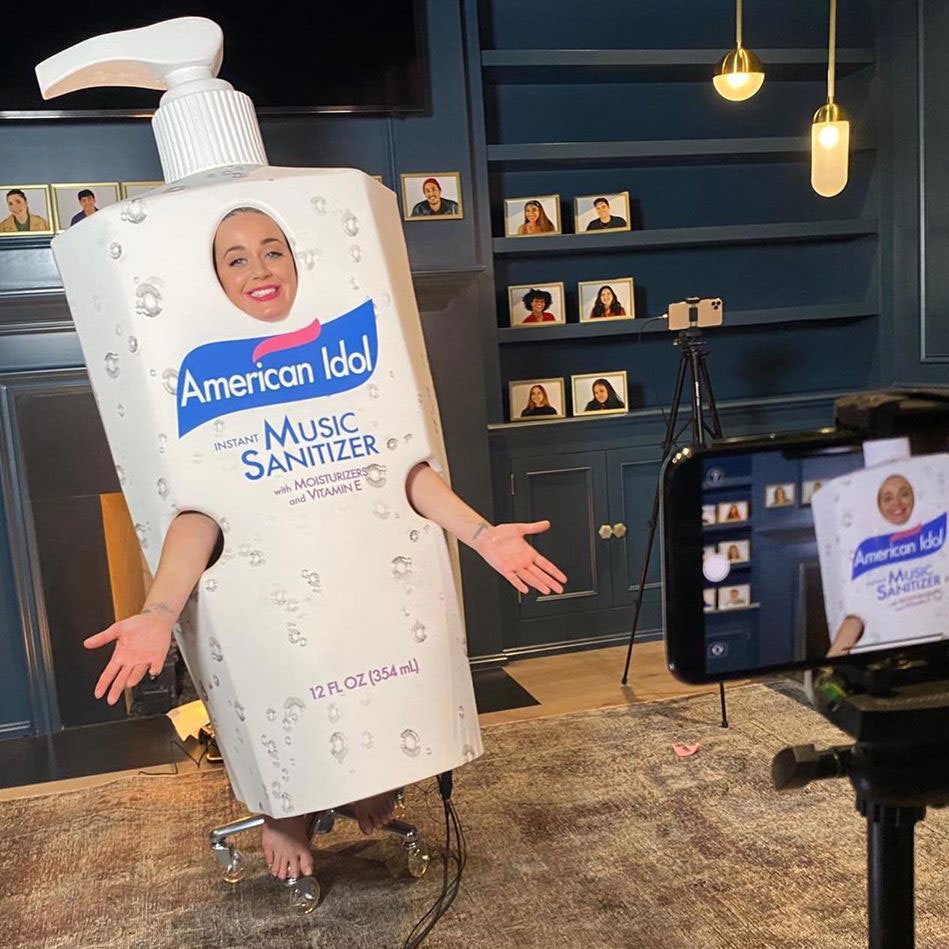Society Has Progressed Past the Need for Katy Perry
Or has it?


Katy Perry was never meant to be taken seriously. This truism has been built into most of her career: after striking out with a failed Christian pop album under her birth name Katy Hudson in 2001, she bounced around the major label system for most of the decade before re-emerging with a new name and a new style on 2008’s One of the Boys. That album introduced a persona—bawdy, campy, faux-provocative, and occasionally self-help-y, candy-coated with a wink and a nudge—that she built on for her artistic and commercial peak Teenage Dream in 2010.
Whipped-cream-canister bras, brace-face mugging, fireworks shooting out of her chest (no one said she was painting with a variety of colors), a song that centered around the chorus “I wanna see your peacock”: Perry wasn’t exactly trafficking in subtle stuff, and the anything-for-a-giggle approach she took for most of the 2010s was light years removed from the era-specific, increasingly self-serious, and emotionally tormented direction that present-day pop has taken. (The infamous Sesame Street controversy and her resulting response was something of masterclass in the Katy Perry comedic approach: do it, and then do it again until enough people laugh.)
Two years after Prism, Perry’s fine third album that gestured vaguely towards her Christian roots, she reached what was considered during The Prelude the peak of your standard pop career by headlining the Super Bowl Halftime Show. Not even an appearance from a keeping-it-in-his-pants-era Lenny Kravitz could distract from the fact that Perry’s live singing is typically wanting. But as with so much of Perry’s career, ability took a backseat to cheap gags, as one of the lethargic shark-costumed performers (“Left Shark” if you’re into the whole brevity thing) that accompanied her during the performance of “California Gurls” became an instant meme in the days that followed.
A few months before the 2016 Presidential election, Perry teamed up with Funny or Die to make the above voting PSA, one of a few that the latter and once-ubiquitous comedy video hub decided to produce. In the realm of massive pre-election fuck-ups committed by celebrities, “Katy Perry Votes Naked” hasn’t possessed the staying power of, say, “Sensual Pantsuit Anthem” or this horrifying monstrosity—but four years into the continued decline of society, in which our government and the people that are governed seem to have entered a stand-off to see who can emerge stupider, a voting PSA centered around the joke of having “skimmed” the Constitution certainly hits different than it would’ve in, say, 2012 or 2008.
Similar to “Sensual Pantsuit Anthem” singer Lena Dunham’s HBO dramedy Girls, Katy Perry as a cultural institution seemed to instantly depreciate in value as soon as the calendar struck November 9, 2016—an instant relegation to the increasingly stuffed nostalgia bin of the Obama era. And the time surrounding Perry’s fourth album Witness mirrored the cavalcade of public gaffes and unforced errors that has become Dunham’s post-Girls career.
There was a four-day self-quarantined livestream that featured yoga sessions with Jesse Tyler Ferguson and an interview with DeRay McKesson about her past of cultural appropriation largely fell flat; an SNL appearance featuring a cameo from Backpack Kid was overshadowed by accusations that Perry had drag queens removed from her performance at Migos’ request. Witness also landed during the public escalation of a years-long legal battle between Perry and Sister Catherine Rose Holman over the former’s purchase of the latter’s then-residence and former convent; two months after the commercially flailing album’s fifth single “Hey Hey Hey” was serviced to Italian radio, Holman collapsed and died in court after publicly pleading that Perry “Please stop.”
An uneven, occasionally interesting album of dance-inspired pop, Witness is both slightly better than you probably remember and not quite good enough to remember at all. The entire album is reminiscent of Christina Aguilera’s electro-tinged misfire Bionic from 2010, both in form and cultural impact.
Less than a year after Bionic’s release, Aguilera would go on to be a judge on The Voice, and Perry did exactly the same with ABC’s American Idol reboot after Witness’ promo cycle died down. The similarities don’t stop there: Witness and Bionic both found their figureheads collaborating more than ever before with explicitly dance-oriented producers and writers (the former had Hot Chip and Duke Dumont, the latter counting Ladytron and Le Tigre amongst its collaborators).
Granted, Perry’s need for new blood on Witness was almost exclusively functional; it marked her first album with no contributions from Lukasz Gottwald, the producer known as Dr. Luke who was sued by Kesha in 2014 for alleged sexual assault and and a variety of abusive behavior. (Gottwald, as it so often is with alleged abusers in the music industry, is still working; this year he scored his latest number-one hit producing Doja Cat’s “Say So” under the pseudonym Tyson Trax, and Doja herself seems poised to pick up Perry’s mantle for a new generation by offering a shitposting, meta-nonsensical update of the latter’s approach.)

It may be tempting to direct blame for Witness’ lack of public impact towards Perry’s Luke-less approach; he previously produced and co-wrote seven of Prism’s thirteen songs, and has been partially responsible for some of her biggest hits. But Perry’s attempts at embracing a vague sense of social awareness throughout the album—an approach she described as ”purposeful pop” in a Twitter reply to Billboard’s current Senior Director Jason Lipshutz—might have been equally to blame, as it made for an ill fit on an artist previously known for not saying much at all.
Even Perry herself seems aware that “wokeness” was and still is not her strongest suit, as she literally changed guises for American Idol’s first remote episode since the beginning of the pandemic this year by donning a full-body hand sanitizer costume for the entire two-hour span.
On paper, the costume surely represented a merge between Perry’s long-established everyday-is-Halloween aesthetic and a milder form of the PSA-style awareness she’d tried her hand at circa Witness; in practice, the visual gag reeked of desperation in trying to square peg-round hole herself into the most terrifying time in recent human history. (Also, not that she could’ve known at the time, but you’re gonna need a lot more than Purell to keep yourself from getting sick.)
If the sartorial decision suggested an ultimate aimlessness in what Perry should be as a pop star in 2020, so has the promo cycle leading up to her fifth album, Smile. Over the last twelve months and change, she’s released a whopping six singles (some of which will be on the album, some of which won’t) leading up to the album’s release next month, none of which have made any significant impact on the charts or elsewhere.
The aesthetic approach behind these songs are more scattershot and dated than ever before; the glowing synth pulse of “Never Really Over” recalls early-2010s Robyn at a time in which the Swedish pop mastermind has immersed herself in more explicitly clubby sounds; the blank spaces and rustling groove of the Charlie Puth co-write “Small Talk” recall the waning-days-of-EDM hit “Rather Be” by Clean Bandit and Jess Glynne, while “Never Worn White”’s miserable balladic blare is the kind of crawling torch song that not even Rihanna has touched in years (back when she was still making music, that is).
Smile’s title track, which was released last week, sidesteps the risk of sounding temporally out-of-place by embracing a vague sense of nostalgia with a sample of Naughty by Nature’s “Jamboree” as its anchor. The song’s lyrics follow in Perry’s professed aim across Smile to make an album that reflects “my journey towards the light - with stories of resilience, hope, and love,” and in an interview with CNN she claimed that her career downturn as well as a brief split from now-partner Orlando Bloom “literally broke me in half” after a decline in “the validation, love, and admiration from the outside world.”
Mental health issues are always to be taken seriously, but it’s hard not to hear lyrics on “Smile” like “Gotta say it’s really been a while/ But now I got back that smile” as bad optics at a time in which a sizable portion of her target audience does not have too much to throw on a clown nose about. The apparent image-reset that Smile could represent hinges on the public getting to know a more emotionally intimate side of Perry—but what if no one really wants to do so at this very moment? Is this really the time for an album in which a pop star soul-searches because people simply don’t like her the way they used to?
Nevertheless, there exists a possible way forward for Perry’s career. The original version of “Daisies,” one of those previously mentioned six singles that will appear on Smile, is the type of perfunctory uplift listeners have come to expect from her amidst the silly costumes and lactation sight gags—but in the hands of Dutch EDM producer Oliver Heldens (whose “Bunnydance” was a favorite of mine in 2015), the song sounds positively massive and beautiful, Perry’s vocals couched in starry-eyed dance music that practically transports listeners to the Electric Daisy in their minds.
Lyrically, EDM (which, yes, most recognize as a sound but actually largely exists in function as a marketing term) has always retained a live-for-tonight vacuousness—a superficiality bolstered by the frequent and relative anonymity of the featured vocalists. If you’re the type to feel something when you hear this music, you don’t care as much about who’s singing as you do about how it makes you feel, and when Perry’s wailing of “I’ll never let ‘em change me/ ‘Til they cover me in daisies” comes in on the peak of Heldens’ remix, her ego and persona seemingly dissolves instantly. She sounds like everything, she sounds like no one at all; she sounds like she’s finally home again.